| Revision as of 04:32, 26 July 2007 editQworty (talk | contribs)13,129 edits →1800s: no, it wasn't the continent that was expanding← Previous edit | Revision as of 04:34, 26 July 2007 edit undoQworty (talk | contribs)13,129 edits →1800s: change America to U.S. for clarityNext edit → | ||
| Line 20: | Line 20: | ||
| * ]: The ] and the ] merge to form the ]. | * ]: The ] and the ] merge to form the ]. | ||
| * ]-]: ] between the ] and the ] of ] | * ]-]: ] between the ] and the ] of ] | ||
| * ]: The ] buys out ]'s territorial claims in ] via the ]. This begins |
* ]: The ] buys out ]'s territorial claims in ] via the ]. This begins the U.S.'s westward expansion to the Pacific referred to as its ] which involves ] from Mexico, Britain, and Native Americans. | ||
| * ]: ] gains independence from ] and becomes the first black republic, culminating the only successful ] ever. | * ]: ] gains independence from ] and becomes the first black republic, culminating the only successful ] ever. | ||
| * ]: ] founded by ]. | * ]: ] founded by ]. | ||
Revision as of 04:34, 26 July 2007
| Millennium |
|---|
| Centuries |
|
| Timelines |
|
| State leaders |
|
| Decades |
|
|
| Expression error: Unrecognized punctuation character "{". |
| Expression error: Unrecognized punctuation character "{". |
The 19th century (also written XIX century) lasted from 1801 through 1900 in the Gregorian calendar.
Overview
Historians sometimes define a "Nineteenth Century" historical era stretching from 1815 (The Congress of Vienna) to 1914 (The outbreak of the First World War); alternatively, Eric Hobsbawm defined the "Long Nineteenth Century" as spanning the years 1789 (the French Revolution) to 1914. Some other scholars even include the preceding period, starting a Very long 19th century at the American Declaration of Independence.
During this century, the Spanish, Chinese, Portuguese, and Ottoman empires began to crumble and the Holy Roman and Mughal empires ceased.
Following the Napoleonic Wars, the British Empire became the world's leading power, controlling one quarter of the world's population and one third of the land area. It enforced a Pax Britannica, encouraged trade, and battled rampant piracy.
Slavery was greatly reduced around the world. Following a successful slave revolt in Haiti, Britain forced the Barbary pirates to halt their practice of kidnapping and enslaving Europeans, banned slavery throughout its domain, and charged its navy with ending the global slave trade. Slavery was then abolished in America and Brazil (see Abolitionism), and serfdom was abolished in Russia
Electricity, steel and petroleum fueled a Second Industrial Revolution which enabled Germany, Japan, and the United States to become great powers that raced to create empires of their own. However, Russia and Qing Dynasty China failed to keep pace with the other world powers which led to massive social unrest in both empires.
Events

1800s
- 1801: The Kingdom of Great Britain and the Kingdom of Ireland merge to form the United Kingdom.
- 1801-15: Barbary War between the United States and the Barbary States of North Africa
- 1803: The United States buys out France's territorial claims in North America via the Louisiana Purchase. This begins the U.S.'s westward expansion to the Pacific referred to as its Manifest Destiny which involves annexing and conquering land from Mexico, Britain, and Native Americans.
- 1804: Haiti gains independence from France and becomes the first black republic, culminating the only successful slave revolt ever.
- 1804: Austrian Empire founded by Francis I.
- 1805-48: Muhammad Ali modernizes Egypt.
- 1806: Holy Roman Empire dissolved as a consequence of the Treaty of Lunéville.
- 1807: Kingdom of Great Britain declares the Slave Trade illegal.
- 1808-09: Russia conquers Finland from Sweden in the Finnish War.
- 1809: Napoleon strips the Teutonic Knights of their last holdings in Bad Mergentheim.
1810s

- 1810: The University of Berlin, the world's first research university, is founded. Among its students and faculty are Hegel, Marx, and Bismarck. The German university reform proves to be so successful that its model is copied around the world (see History of European research universities).
- 1810s-20s: Most of the Latin American colonies free themselves from the Spanish and Portuguese Empires after the Mexican War of Independence and the South American Wars of Independence.
- 1812-15: War of 1812 between the United States and the United Kingdom
- 1813-1907: The contest between the British Empire and Imperial Russia for control of Central Asia is referred to as the Great Game.
- 1815: The Congress of Vienna redraws the European map. The Concert of Europe attempts to preserve this settlement, but it fails to stem the tide of liberalism and nationalism that sweeps over the continent.
- 1815: Napoleon's defeat at Waterloo brings a conclusion to the Napoleonic Wars and marks the beginning of a Pax Britannica which lasts until 1870.
- 1816: Year Without a Summer
- 1816-28: Shaka's Zulu kingdom becomes the largest in Southern Africa.
- 1819: The modern city of Singapore is established by the British East India Company.
1820s
- 1820: Liberia founded by the American Colonization Society for freed American slaves.
- 1821-27: Greece becomes the first country to break away from the Ottoman Empire after the Greek War of Independence.
- 1823-87: The British Empire annexed Burma (now called Myanmar) after three Anglo-Burmese Wars.
- 1825: Erie Canal opened connecting the Great Lakes to the Atlantic Ocean.
- 1826-28: After the final Russo-Persian War, the Persian Empire took back territory lost to Russia from the previous war.
- 1825-28: The Argentina-Brazil War results in the independence of Uruguay.
1830s
- 1830: France invades and occupies Algeria.
- 1830: The Belgian Revolution in the United Kingdom of the Netherlands led to the creation of Belgium.
- 1830: Greater Colombia dissolved and the nations of Colombia, Ecuador, Venezuela, and Panama took its place.
- 1833: Slavery Abolition Act bans slavery throughout the British Empire.
- 1833-76: Carlist Wars in Spain.
- 1834: Spanish Inquisition officially ends.
- 1835-36: The Texas Revolution in Mexico resulted in the short-lived Republic of Texas.
- 1837-1901: Queen Victoria's reign is considered the apex of the British Empire and is referred to as the Victorian era.
- 1838-40: Civil war in the Federal Republic of Central America led to the foundings of Guatemala, El Salvador, Honduras, Nicaragua, and Costa Rica.
- 1839-51: Uruguayan Civil War
- 1839-60: After two Opium Wars, France, the United Kingdom, the United States and Russia gained many concessions from China and the Qing Dynasty went into decline.
1840s
- 1840: New Zealand is founded, as the Treaty of Waitangi is signed by the Maori and European people.
- 1844: Millerite movement awaits the Second Advent of Jesus Christ on October 22. Christ's non-appearance becomes known as the Great Disappointment.
- 1844 - Persian Prophet the Báb announces his revelation, founding Bábísm. He announced to the world of the coming of "He whom God shall make manifest." He is considered the forerunner of Bahá'u'lláh, the founder of the Bahá'í Faith.
- 1845-49: The Irish Potato Famine led to the Irish diaspora.
- 1846-48: The Mexican-American War leads to Mexico's cession of much of the modern-day Southwestern United States.
- 1846-47: Mormon migration to Utah.
- 1848: The Communist Manifesto published.
- 1848: Revolutions of 1848 in Europe
- 1848-58: California Gold Rush
1850s
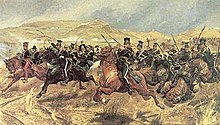
- 1850: The Little Ice Age ends around this time.
- 1851-60s: Victorian gold rush in Australia
- 1851-64: The Taiping Rebellion in China is the bloodiest conflict of the century.
- 1854: The Convention of Kanagawa formally ends Japan's policy of isolation.
- 1854-56: Crimean War between France, the United Kingdom, the Ottoman Empire and Russia
- 1855: Bessemer process enables steel to be mass produced.
- 1856: World's first oil refinery in Romania
- 1857-58: Indian Rebellion of 1857
- 1859: The Origin of Species published.
1860s

- 1861-65: American Civil War between the Union and seceding Confederacy
- 1861: Russia abolishes serfdom.
- 1861-67: French intervention in Mexico
- 1863: Formation of the International Red Cross is followed by the adoption of the First Geneva Convention in 1864.
- 1864-66: The Chincha Islands War was an attempt by Spain to regain its South American colonies.
- 1864-70: The War of the Triple Alliance ends Paraguayan ambitions for expansion and destroys much of the Paraguayan population.
- 1865-77: Reconstruction in the United States
- 1866: Successful transatlantic telegraph cable follows an earlier attempt in 1858.
- 1866: Austro-Prussian War results in the dissolution of the German Confederation and the creation of the North German Confederation and the Austrian-Hungarian Dual Monarchy.
- 1866-69: After the Meiji Restoration, Japan embarks on a program of rapid modernization.
- 1867: The United States purchased Alaska from Russia.
- 1867: Canadian Confederation formed.
- 1869: First Transcontinental Railroad completed in United States.
- 1869: The Suez Canal opens linking the Mediterranean to the Red Sea.
1870s
- 1870-71: The Franco-Prussian War results in the unifications of Germany and Italy, the collapse of the Second French Empire, the breakdown of Pax Britannica, and the emergence of a New Imperialism.
- 1871-1914: Second Industrial Revolution
- 1870s-90s: Long Depression in Western Europe and North America
- 1872: Yellowstone National Park is created.
- 1873: Maxwell's A Treatise on Electricity and Magnetism published.
- 1874: The British East India Company is dissolved.
- 1875-1900: 26 million Indians perished in India due to famine.
- 1876-1914: The massive expansion in population, territory, industry and wealth in the United States is referred to as the Gilded Age.
- 1877: Great Railroad Strike in the United States may have been the world's first nationwide labor strike.
- 1877-78: The Balkans are freed from the Ottoman Empire after another Russo-Turkish War in the Treaty of Berlin.
- 1878: First commercial telephone exchange in New Haven, Connecticut.
- 1879: Anglo-Zulu War in South Africa.
- 1879-84: War of the Pacific between Peru, Bolivia and Chile.
1880s
- 1880-1902: The United Kingdom conquers Dutch settlers in South Africa in two Boer Wars.
- 1881: First electrical power plant and grid in Godalming, Britain.
- 1884-85: The Berlin Conference signals the start of the European Scramble for Africa. Attending nations also agree to ban trade in slaves.
- 1884-85: The Sino-French War led to the formation of French Indochina.
- 1886: Russian-Circassian War ended with the defeat of the Circassians and the exile of many Circassians into the world. Imam Shamil defeated.
- 1888: Slavery banned in Brazil.
- 1889: Hazrat Mirza Ghulam Ahmad establishes the Ahmadi Muslim Community.
- 1889: End of the Brazilian Empire and the beginning of the Brazilian Republic
1890s
- 1890: The Wounded Knee Massacre was the last battle in the American Indian Wars. This event represents the end of the American Old West.
- 1894-95: After the First Sino-Japanese War, China cedes Taiwan to Japan and grants Japan a free hand in Korea.
- 1895-1896: Ethiopia defeats Italy in the First Italo–Ethiopian War.
- 1896: Olympic games revived in Athens.
- 1896: Klondike Gold Rush in Canada.
- 1897: Gojong, or Emperor Gwangmu, proclaims the short-lived Korean Empire Until 1910.
- 1898: The United States gains control of Cuba, Puerto Rico, and the Philippines after the Spanish-American War.
- 1898-1900: The Boxer Rebellion in China is suppressed by an Eight-Nation Alliance.
- 1898-1902: The One Thousand Days war in Colombia breaks out between the "Liberales" and "Conservadores," culminating with the loss of Panama in 1903.
- 1899-1913: The Philippine-American War.
Significant people
- William Gilbert Grace, English cricketer
- Baron Haussmann, civic planner
- Sándor Körösi Csoma, explorer of the Tibetan culture
- Hong Xiuquan inspired China's Taiping Rebellion, perhaps the bloodiest civil war in human history
- Fitz Hugh Ludlow, writer and explorer
- Florence Nightingale, nursing pioneer
- Ignaz Semmelweis, proponent of hygienic practices
- Dr. John Snow, the founder of epidemiology
- F R Spofforth, Australian cricket
- Sitting Bull, a leader of the Lakota
- Chief Joseph, a leader of the Nez Percé
- Ned Kelly, Australian folk hero, and outlaw
- Abraham Lincoln, United States President
- Jefferson Davis, Confederate States President
- Elizabeth Kenny, Australian Nurse and found an Innovative Treatment of Polio
Anthropology

Painters
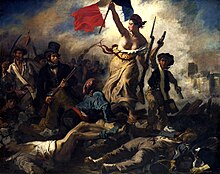

The Realism and Romanticism of the early 19th century gave way to Impressionism and Post-Impressionism in the later half of the century, with Paris being the dominant art capital of the world. 19th century painters included:
- Paul Cezanne
- Edgar Degas
- Eugène Delacroix
- Edvard Munch
- Caspar David Friedrich
- Antonio de La Gandara
- Théodore Géricault
- Vincent van Gogh
- Jean Auguste Dominique Ingres
- Édouard Manet
- Claude Monet
- Berthe Morisot
- Camille Pissarro
- Pierre-Auguste Renoir
- Henri de Toulouse-Lautrec
- Joseph Mallord William Turner
- William Morris
- Mary Cassatt
Music
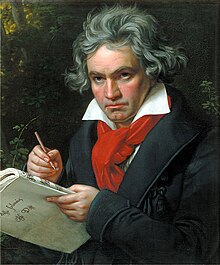
Sonata form matured during the Classical era to become the primary form of instrumental compositions throughout the 19th century. Much of the music from the nineteenth century was referred to as being in the Romantic style. Many great composers lived through this era such as Ludwig van Beethoven, Franz Liszt, Frédéric Chopin, Peter Ilyich Tchaikovsky and Richard Wagner. Others included:
- Hector Berlioz
- Georges Bizet
- Alexander Borodin
- Johannes Brahms
- Anton Bruckner
- Frédéric Chopin
- Claude Debussy
- Antonín Dvořák
- Gilbert and Sullivan
- Edvard Grieg
- Felix Mendelssohn
- Modest Mussorgsky
- Niccolò Paganini
- Camille Saint-Saëns
- Franz Schubert
- Robert Schumann
- Giuseppe Verdi
Literature
Main article: 19th century in literature
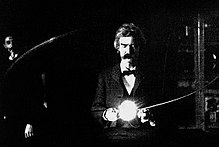

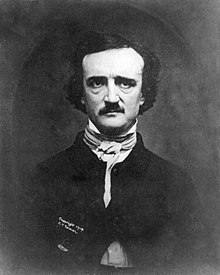
On the literary front the new century opens with Romanticism, a movement that spread throughout Europe in reaction to 18th-century rationalism, and it develops more or less along the lines of the Industrial Revolution, with a design to react against the dramatic changes wrought on nature by the steam engine and the railway. William Wordsworth and Samuel Taylor Coleridge are considered the initiators of the new school in England, while in the continent the German Sturm und Drang spreads its influence as far as Italy and Spain.
French arts had been hampered by the Napoleonic Wars but subsequently developed rapidly. Modernism began.
The Goncourts and Emile Zola in France and Giovanni Verga in Italy produce some of the finest naturalist novels. Italian naturalist novels are especially important in that they give a social map of the new unified Italy to a people that until then had been scarcely aware of its ethnic and cultural diversity. On February 21, 1848, Karl Marx and Friedrich Engels published the Communist Manifesto.
There was a huge literary output during the 19th century. Some of the most famous writers included the Russians Leo Tolstoy, Anton Chekov and Fyodor Dostoevsky; the English Charles Dickens, John Keats, and Jane Austen; the Scottish Sir Walter Scott; the Irish Oscar Wilde; the Americans Edgar Allan Poe and Mark Twain; and the French Victor Hugo, Honoré de Balzac, Jules Verne and Charles Baudelaire. Some others of note included:
- Gustavo Adolfo Bécquer
- Charlotte Brontë
- Emily Brontë
- Lord Byron
- Georg Büchner
- François-René de Chateaubriand
- Kate Chopin
- Samuel Taylor Coleridge
- Emily Dickinson
- Arthur Conan Doyle
- Alexandre Dumas, père (1802-1870)
- George Eliot
- Ralph Waldo Emerson
- Gustave Flaubert
- Margaret Fuller
- Johann Wolfgang von Goethe
- Nikolai Gogol
- Manuel González Prada
- Gertrudis Gómez de Avellaneda
- Juana Manuela Gorriti
- Thomas Hardy
- Nathaniel Hawthorne
- Friedrich Hölderlin
- Heinrich Heine
- Henrik Ibsen
- Henry James
- Jules Laforgue
- Giacomo Leopardi
- Alessandro Manzoni
- Stéphane Mallarmé
- José Martí
- Clorinda Matto de Turner
- Herman Melville
- Aleksandr Pushkin
- Arthur Rimbaud
- John Ruskin
- George Sand (Amandine-Aurore-Lucile Dupin)
- Mary Shelley
- Stendhal (Marie-Henri Beyle)
- Robert Louis Stevenson
- Bram Stoker
- Harriet Beecher Stowe
- Paul Verlaine
- Walt Whitman
- William Wordsworth
- Alfred, Lord Tennyson
- Émile Zola
- Machado de Assis
Science
The 19th century saw the birth of science as a profession; the term scientist was coined in 1833 by William Whewell. Among the most influential ideas of the 19th century were those of Charles Darwin, who in 1859 published the book The Origin of Species, which introduced the idea of evolution by natural selection. Louis Pasteur made the first vaccine against rabies, and also made many discoveries in the field of chemistry, including the asymmetry of crystals. Thomas Alva Edison gave the world light with his invention of the lightbulb. Karl Weierstrass and other mathematicians also carried out the arithmetization of analysis. Other important 19th century scientists included:
- Amedeo Avogadro, physicist
- Johann Jakob Balmer, mathematician, physicist
- Henri Becquerel, physicist
- Alexander Graham Bell, inventor
- Ludwig Boltzmann, physicist
- János Bolyai, mathematician
- Louis Braille, inventor of braille
- Robert Bunsen, chemist
- Marie Curie, physicist, chemist
- Pierre Curie, physicist
- Louis Daguerre, chemist
- Gottlieb Daimler, engineer, industrial designer and industrialist
- Christian Doppler, physicist, mathematician
- Thomas Edison, inventor
- Michael Faraday, scientist
- Léon Foucault, physicist
- Gottlob Frege, mathematician, logician and philosopher
- Carl Friedrich Gauss, mathematician, physicist, astronomer
- Josiah Willard Gibbs, physicist
- Ernst Haeckel, biologist
- Heinrich Hertz, physicist
- Alexander von Humboldt, naturalist, explorer
- Nikolai Lobachevsky, mathematician
- William Thomson, Lord Kelvin, physicist
- Robert Koch, physician, bacteriologist
- Justus von Liebig, chemist
- Auguste and Louis Lumière, inventors
- Wilhelm Maybach, car-engine and automobile designer and industrialist.
- James Clerk Maxwell, physicist
- Gregor Mendel, biologist
- Dmitri Mendeleev, chemist
- Samuel Morey, inventor
- Nicéphore Niépce,inventor
- Alfred Nobel, chemist, engineer, inventor
- Louis Pasteur, microbiologist and chemist
- Bernhard Riemann, mathematician
- Nikola Tesla, inventor
- Sigmund Freud, the father of psychoanalysis
Philosophy and religion
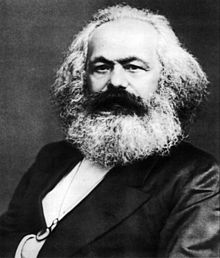



The 19th century was host to a variety of religious and philosophical thinkers, including:
- Mikhail Bakunin, anarchist
- William Booth, social reformer, founder of the Salvation Army
- Auguste Comte, philosopher
- Georg Wilhelm Friedrich Hegel, philosopher
- Søren Kierkegaard, philosopher
- Karl Marx, political philosopher
- John Stuart Mill, philosopher
- Friedrich Nietzsche, philosopher
- Ramakrishna Paramahamsa, Hindu mystic
- Arthur Schopenhauer, philosopher
- Claude Henri de Rouvroy, Comte de Saint-Simon, founder of French socialism
- William Morris, social reformer
- Joseph Smith, Jr. and Brigham Young, founders of Mormonism
- Nikolai of Japan, religious leader, introduced Eastern Orthodoxy into Japan.
- Bahá'u'lláh founded the Bahá'í Faith in Persia
Politics
- Susan B. Anthony, U.S. women's rights advocate
- Otto von Bismarck, German chancellor
- Napoleon Bonaparte, French general, first consul and emperor
- Napoleon III
- Cecil Rhodes
- John C. Calhoun, U.S. senator
- Henry Clay, U.S. senator
- Jefferson Davis, President of the Confederate States of America just before and during the American Civil War.
- Frederick Douglass, U.S. abolitionist spokesman
- Joseph Fouché, French politician
- Giuseppe Garibaldi, unifier of Italy and Piedmontese soldier
- Gojong of Joseon, Korean emperor
- William Lloyd Garrison, U.S. abolitionist leader
- William Ewart Gladstone, British prime minister
- Ulysses S. Grant, U.S. general and president
- Theodor Herzl, founder of modern political Zionism
- Andrew Jackson, U.S. general and president
- Thomas Jefferson, American statesman, philosopher, and president
- Lajos Kossuth, Hungarian governor; leader of the war of independence
- Hong Xiuquan, revolutionary, self-proclaimed Son of God
- Benjamin Disraeli, novelist and politician
- Libertadores, Latin American liberators
- Robert E. Lee, Confederate general
- Abraham Lincoln, U.S. president; led the nation during the American Civil War
- Sir John A. Macdonald, Canada, first Prime Minister of Canada
- Mutsuhito, Japanese emperor
- Tokugawa Yoshinobu, Japanese Shogun (The Last Shogun)
- István Széchenyi, aristocrat, leader of the Hungarian reform movement
- Charles Maurice de Talleyrand, French politician
- Queen Victoria, British monarch
- Klemens von Metternich, Austrian Chancellor
Inventions, discoveries, introductions
Main articles: Timeline of invention § 19th century, and Timeline of scientific discoveries § 1800sResearch became institutionalized at research universities such as the University of Berlin and at corporate laboratories such as Edison's Menlo Park which accelerated the rate at which discoveries and innovations were made.
- Telephone
- Railways
- The Tube
- Department stores
- Epidemiology
- Mail order businesses
- Philology
- Postage stamps
- Public buses
- Subway
- Steam power
See also
- Victorian Era
- List of wars 1800–1899
- Timeline of 19th century Islamic history
- France in the nineteenth century
- Russian history, 1855–1892
- Mid-nineteenth century Spain
- Capitalism in the nineteenth century
- 19th-century philosophy
- Nineteenth century theatre
- 19th century in games
- 19th century in film
Decades and years
| Decades and years | |
|---|---|
| 19th century 17th century ← 18th century ← ↔ → 20th century → 21st century |
| Centuries and millennia | |||||||||||||||||||||||||||||||||||||||||||||||||||||||||||||||||||||||||||||||||||||||||||||||||||||||||||||||
|---|---|---|---|---|---|---|---|---|---|---|---|---|---|---|---|---|---|---|---|---|---|---|---|---|---|---|---|---|---|---|---|---|---|---|---|---|---|---|---|---|---|---|---|---|---|---|---|---|---|---|---|---|---|---|---|---|---|---|---|---|---|---|---|---|---|---|---|---|---|---|---|---|---|---|---|---|---|---|---|---|---|---|---|---|---|---|---|---|---|---|---|---|---|---|---|---|---|---|---|---|---|---|---|---|---|---|---|---|---|---|---|
| |||||||||||||||||||||||||||||||||||||||||||||||||||||||||||||||||||||||||||||||||||||||||||||||||||||||||||||||